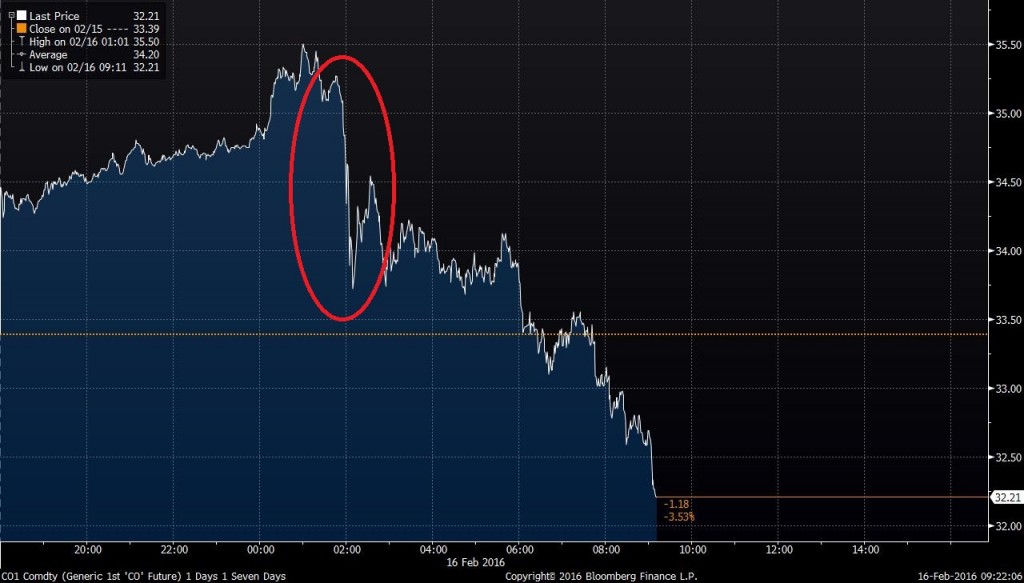Markets unsatisfied with deal to maintain production
The first signs of cooperation between OPEC and non-OPEC countries on crude oil production emerged today in the form of a deal between Russia and three OPEC members, including the group’s largest producer, Saudi Arabia. Russia, Saudi Arabia, Venezuela and Qatar agreed to a production freeze today, as the global glut of crude oil continues to keep downward pressure on prices.
The deal between the countries will fix production at January levels, according to Bloomberg. In the first month of the year, Saudi Arabia produced 10.2 MMBOPD and Russia produced 10.9 MMBOPD, while Venezuela and Qatar produced significantly less at 2.4 MMBOPD and 0.7 MMBOPD, respectively.
Oil prices bounced more than 12% off 12-year lows last week as rumors of the talks held in Doha today began to circulate. Crude oil prices peaked this morning just before the talks, but then came down following the announcement of the deal between the parties. While an agreement to not increase production further is certainly welcome news, Saudi Arabia and Russia both had very little spare capacity to add to markets, and with Iran and Iraq both increasing production, the deal means very little for overall supply and demand.
“This is an announcement of a production freeze among countries whose production didn’t even grow recently,” said Eugen Weinberg, head of commodities research at Commerzbank. “If Iran and Iraq are not a part of the agreement, it’s not worth much — and even then there is still a question of compliance.”
“[Today’s price] now reflects the news being only a freeze and only a conditional freeze [at that],” NAPIA and Energy Directions President Mike Smolinski told Oil & Gas 360®. “The only bullish news is that there is an agreement to forgo production growth amongst a few exporters… Nevertheless, $32.33 is still $4.50 (+16%) above the contract’s January 20, 2016 intra-day low.”
Iran remains insistent on increasing production to gain back market share the country lost while under international sanctions. “Iran will not forgo its share of the market,” Iranian Oil Minister Bijan Zanganeh was quoted as saying today.
“The market does not need a freeze. It needs a reduction,” said Michael Lynch, president of Strategic Energy and Economic Research. “They are not offering anything like that.”
Laying the groundwork for future cooperation
While the markets were disappointed by the lack of production cuts from today’s meeting, it still represents the first significant cooperation between OPEC and non-OPEC producers in 15 years, and it may lay the groundwork for more concrete action in the future. The deal is the “beginning of a process” that could require “other steps to stabilize and improve the market,” according to Saudi Oil Minister Ali al-Naimi.
“The reason we agreed to a potential freeze of production is simply the beginning of a process over next few months,” Naimi told reporters. “We don’t want significant gyrations in prices. We don’t want a reduction in supply. We want to meet demand. We want a stable oil price.”

“It is a positive step in the right direction in a transition period,” a Persian Gulf oil official told New York Times on condition of anonymity. “The main driver is prices going below $30 a barrel, which was very disturbing.”
“A production freeze is part of the events that must take place for crude oil exporters to resume receiving a larger share of what consumers willing pay for oil,” said Smolinski. “Despite how often we hear it said, that exporters must strive to produce and export more to increase revenue, doing so doesn’t work.”
The agreement represents a shift from Saudi Arabia’s policy of defending market share as the kingdom works with one of its major competitors. Russia has increasingly grown its share of Asian markets traditionally held by Saudi Arabia, while OEPC’s largest producer has increased its share of European markets as they try to reduce their dependence on Russian gas.
The two countries are also on opposing sides of the Syrian civil war, making cooperation on oil even more significant on the geopolitical scale.
A statement from the Russian Ministry of Energy following the talks indicated that the four countries involved would only stay with the plan if others followed suit, however. “The four countries – Russia, Saudi Arabia, Qatar and Venezuela – are ready to freeze oil production at January levels if other producers join this initiative,” the statement said.
Gaining the support of other countries like Iran could prove difficult, but exceptions may be made if a coordinated effort by a broad range of producers decide to join in the effort. There is a precedent for some countries being excused from full compliance with a freeze in order to secure their backing.
Saudi Arabia is unlikely to grant Iran carte blanche to undercut prices, however, said Smolinski. “I expect Saudi Arabia to closely watch Iran. If Iran attempts to notably increase its sales using significant price discounts … I expect Saudi Arabia to continue to match prices.”
In 1999, when OPEC worked with other producers including Mexico to fight an oil price slump, Saudi Arabia agreed to let Iran fix output at a higher level. A similar concession may be in the cards for wider OPEC cooperation, but a truly coordinated plan for lowering global production still seems anything but certain.







